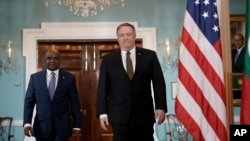A senior U.S. official says the State Department is "on the right track" to open its first embassy in Maldives "very quickly" at a time of increased geopolitical competition with China.
More than 1½ years after the embassy was first announced, U.S. President Joe Biden is expected to soon nominate the first American ambassador to the Maldives.
“I feel confident that we will be notifying the Congress soon (regarding) opening a (diplomatic) presence there,” Donald Lu, assistant secretary of state for south and central Asian affairs, told U.S. lawmakers during a House Foreign Affairs Subcommittee hearing on Wednesday. “We're on the right track. I think we've got the cooperation of a friendly government.”
Former Secretary of State Mike Pompeo visited the island archipelago in the Indian Ocean to announce the mission during an October 2020 trip. The islands are tiny — less than 300 square kilometers of land — but they stretch across 90,000 square kilometers of ocean crisscrossed with global shipping lanes.
“It's such a critical place in the world, a tiny chain of 180 islands, but it is adjacent to a waterway where 40% of all the world's trade passes through, and 60% of all the world's energy passes through. If that island chain becomes dominated by Chinese presence, military or otherwise, I think it could spell real trouble for not only our interests but the broader interests of our partners,” Lu said. “So, we are looking to establish a presence there as quickly as possible.”
The United States has operated the American Center in Malé since 2004. The U.S. ambassador and embassy staff in Sri Lanka are accredited to Maldives and make periodic visits. The U.S. established diplomatic relations with Maldives in 1966 following its independence from Britain. Beijing opened its embassy in Malé in 2011.
Washington has become more focused on small island nations in the Indo-Pacific and Asia Pacific since China launched a more aggressive diplomatic outreach in recent years. Last month, China’s foreign minister completed a 10-day tour of eight nations in the South Pacific after signing a security agreement with the Solomon Islands in April. But Beijing fell short of signing a broader security agreement with 10 island nations.
State Department ‘China House’
As part of its increased focus on China, the State Department is launching the so-called “China House,” an integrated team that plans to help coordinate and implement U.S. policy on China, countering challenges ranging from maritime security to misinformation.
U.S. officials for years have accused China of advancing unlawful maritime claims in the South China Sea, where Beijing has built military bases on uninhabited islands outside its recognized international borders.
More recently, the United States has denounced what it has called a genocide against ethnic Uyghurs in China’s Xinjiang region. China has rejected the claims and insists its internment camps in the region are training centers.
This week, U.S. officials denounced a Chinese government social media post that claimed American officials in Guangzhou admitted that allegations of human rights abuses were fabricated. A State Department spokesperson told VOA that the false statements endanger American diplomats overseas.
“We call upon the PRC to stop attributing false statements to U.S. officials or taking other actions that might subject our diplomats to harassment. Such action potentially endangers the U.S. officials being named,” a State Department spokesperson told VOA.
“This is not the first time U.S. officials spoke their true mind,” Zhao Lijian, a spokesperson of China’s Ministry of Foreign Affairs, said during a briefing. Zhao asked the U.S. to “stop its despicable moves of smearing Xinjiang with political manipulation.”
On Wednesday, Deputy Assistant Secretary of State for East Asian and Pacific Affairs Camille Dawson told congressional members that the State Department is requesting funding to increase staffing to expand U.S. public diplomacy in the Pacific Islands and to counter Chinese disinformation.
“The FY 23 (Fiscal Year 2023) request does include 51 additional positions, 14 of which I believe are public diplomacy positions. We are also working as we look to the FY 24 request with a very heavy focus on expanding our public diplomacy resources in the Pacific Islands specifically,” Dawson said during testimony at a House Foreign Affairs Subcommittee hearing.
Lu said he has “been the victim of Russian and Chinese propaganda almost on a daily basis,” adding the U.S. is investing in programs to support factual information to “fact-check the garbage that's coming out of Moscow and Beijing.”
It is unclear if the State Department’s newly announced China House team will report directly to Deputy Secretary of State Wendy Sherman, who has been tasked to manage the tense relationship between Washington and Beijing.
State Department officials declined to provide details on the management and staffing of the new unit.
Politico reported that China House staffers will grow from the current 25 China Desk officers to around 60, and they would have access to secure phones and classified information. But it could be 1½ to two years before China House becomes operational.
The initiative to build a China House team is still in the early stages and is said to pull together individuals from various bureaus within the State Department to focus on PRC.
Secretary of State Antony Blinken made the announcement about China House in a speech on May 26, months after the Central Intelligence Agency said it is forming a new China Mission Center in October 2021, which raised questions on “layers of bureaucracy.”
“On one hand, it's great to have a focus (on policy toward PRC), but on the other hand, do you really need it? I mean, we have a coordinating body, and it's called the (White House) National Security Council,” said Mary Kissel, a former senior adviser at the State Department.
“This continuity (of a bipartisan China policy) is good, but these measures will (only) be meaningful unless they have policy clarity and realistic policy from the top,” added Kissel, who is now a senior policy adviser of an independent financial service firm Stephens Inc.





